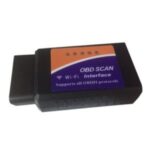Choosing the right OBD2 scanner can feel overwhelming with so many options available. This guide will help you understand the different types of OBD2 scanners and their features, enabling you to make an informed decision based on your needs and budget.
Understanding OBD2 Scanners
OBD2 scanners, also known as diagnostic code readers, are essential tools for car owners and mechanics alike. They plug into your vehicle’s OBD2 port, typically located under the dashboard, and communicate with the car’s computer to retrieve diagnostic trouble codes (DTCs). These codes indicate potential problems with your vehicle’s engine, transmission, emissions system, and other components.
Types of OBD2 Scanners
OBD2 scanners range from basic code readers to advanced professional-grade tools. Here’s a breakdown of the common types:
1. Basic Code Readers: These entry-level scanners display DTCs and their definitions. They are ideal for car owners who want to quickly identify the cause of a check engine light.
2. Code Readers with Live Data: These scanners provide real-time data from various sensors, allowing you to monitor engine performance and identify potential issues before they become major problems. They often include features like freeze frame data capture.
3. Professional-Grade Scan Tools: These comprehensive tools offer advanced features like bi-directional control, allowing you to perform tests and activate components. They also provide access to manufacturer-specific codes and data. Tools like the Autel Maxisys Ultra EV are designed for complex diagnostic work on electric vehicles.
4. Smartphone/Tablet-Based Scanners: These scanners connect to your smartphone or tablet via Bluetooth or Wi-Fi, using an app to display and interpret data. They are portable and often offer a wide range of features at a more affordable price. The Autel MaxiIM IM608 Pro II is a powerful key programming tool that exemplifies this category.
Factors to Consider When Buying
When choosing an OBD2 scanner, consider the following factors:
- Your Skill Level: If you’re a beginner, a basic code reader might suffice. For more experienced users, a scanner with live data or bi-directional control may be necessary.
- Your Vehicle: Some scanners are designed for specific vehicle makes or models. Ensure compatibility with your car before purchasing.
- Your Budget: OBD2 scanners range in price from under $20 to several thousand dollars. Set a budget before you start shopping.
- Features: Consider features like live data, freeze frame data, bi-directional control, and manufacturer-specific code support. TPMS tools like the Autel MaxiTPMS TS508WF offer specialized functionality for tire pressure monitoring systems.
Conclusion
Selecting the right OBD2 scanner involves understanding your needs, budget, and the available features. By carefully considering these factors, you can choose a tool that empowers you to diagnose and troubleshoot car problems effectively. Whether you need a basic code reader for simple diagnostics or a professional-grade scanner for in-depth analysis, there is an OBD2 scanner to suit your requirements. Remember to research specific models and read reviews before making your final decision.

